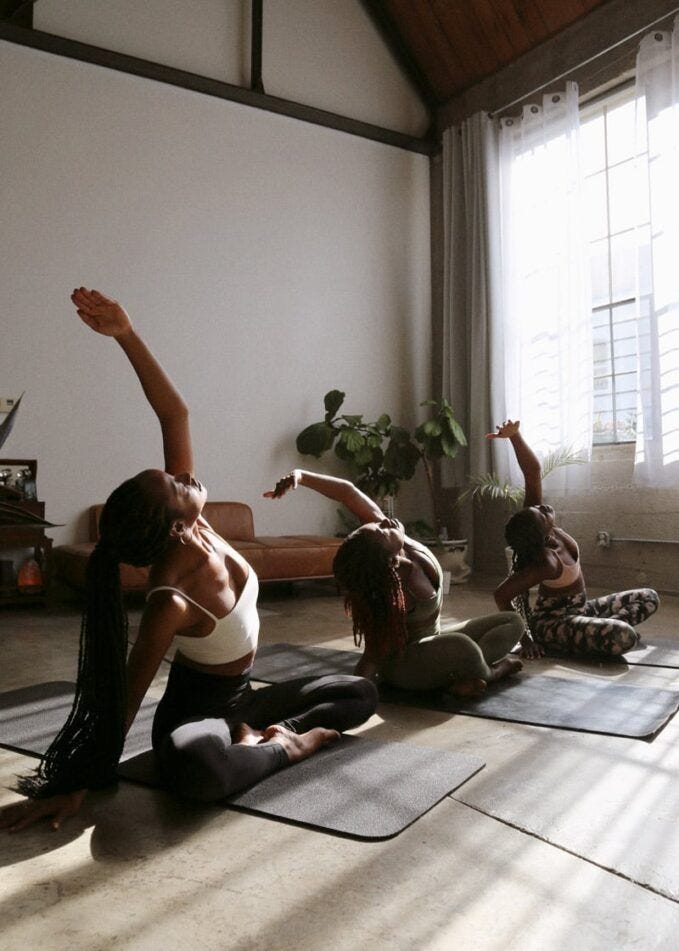The Importance of Black Yoga Instructors and Yoga as a Spiritual Creative Tool
Self Care & Balance - Realm Fam
Yoga has evolved from its ancient origins in India to become a global practice associated with physical fitness, mental health, and spiritual growth. While its modern-day popularity is undeniable, the diversity in its instruction often falls short of representing the wide array of practitioners it serves. For Black communities, yoga offers a unique opportunity for healing, empowerment, and self-expression, but the visibility and representation of Black yoga instructors are crucial for this potential to be fully realized.
In this article, we explore why Black yoga instructors are essential in making yoga accessible and meaningful for marginalized communities. We’ll also examine how yoga serves as a spiritual and creative tool for self-discovery, resilience, and growth, especially for those navigating systems of oppression.

Historically, the mainstream portrayal of yoga has centered on white, affluent individuals, often alienating people of color from this transformative practice. Black yoga instructors challenge this norm, making yoga more inclusive and reflective of the diverse communities it can serve. Representation is critical because it:
Breaks Down Stereotypes: By seeing Black instructors lead classes, other Black individuals are encouraged to explore yoga without feeling it’s "not for them."
Fosters Cultural Relevance: Black yoga instructors often adapt their classes to resonate with the cultural and spiritual needs of their students. This might include incorporating music, affirmations, or themes that reflect shared experiences.
Builds Trust and Belonging: When instructors and students share similar backgrounds, it creates a sense of safety and understanding, which is essential for practices like yoga that involve vulnerability and self-exploration.
Black yoga instructors are more than teachers; they serve as role models, dismantling the societal narratives that exclude Black people from wellness spaces.
Yoga’s benefits extend far beyond the mat, offering a sanctuary for individuals grappling with the effects of systemic racism, intergenerational trauma, and chronic stress. Black communities often face these challenges disproportionately, making the healing aspects of yoga particularly relevant.
Trauma-Informed Yoga Practices
Many Black yoga instructors are trained in trauma-informed yoga, which tailors the practice to prioritize emotional safety and self-regulation. This approach is transformative because it helps individuals:
Reconnect with their bodies in a non-judgmental way.
Manage symptoms of anxiety, depression, and PTSD.
Develop tools for resilience in the face of systemic challenges.
Collective Healing
Yoga classes led by Black instructors often become spaces of collective healing. They provide opportunities for community members to share experiences, support one another, and cultivate a shared sense of empowerment. This collective aspect transforms yoga from an individual practice into a powerful community-building tool.
At its core, yoga is a spiritual practice rooted in the union of mind, body, and spirit. For Black individuals, yoga offers a pathway to reclaiming spirituality in a way that honors their heritage, creativity, and individuality.
Spiritual Liberation Through Yoga
For many, spirituality has been a source of strength and resilience in the face of adversity. Yoga complements this by providing a structured yet flexible framework for spiritual exploration. Black instructors often emphasize the spiritual aspects of yoga, encouraging students to:
Meditate on affirmations that counteract negative societal messages.
Explore breathwork as a means of connecting to a higher self or divine energy.
View the physical practice as a form of prayer, gratitude, or intention-setting.
In doing so, yoga becomes more than just a physical exercise—it becomes a tool for spiritual liberation and self-empowerment.
A Creative Tool for Self-Expression
Yoga also serves as a canvas for creativity. Black yoga instructors often bring unique flair to their classes, blending traditional poses with contemporary influences. For students, this opens up opportunities for self-expression through movement. The creative potential of yoga can manifest in:
Dance-Inspired Sequences: Combining yoga with elements of African or hip-hop dance to celebrate cultural heritage.
Personalized Practices: Encouraging students to modify poses in ways that feel authentic to their bodies and emotions.
Artistic Rituals: Incorporating journaling, music, or visual art alongside yoga to deepen the reflective process.
This intersection of yoga and creativity allows individuals to reclaim agency over their bodies and narratives.
While the contributions of Black yoga instructors are invaluable, they often face systemic barriers in gaining recognition and access to resources. Supporting these instructors is essential for creating a more equitable yoga community. Here’s how this can be done:
Amplify Their Voices: Highlight the work of Black yoga instructors through social media, interviews, and community events.
Provide Funding and Opportunities: Offer scholarships, grants, and mentorship programs to help aspiring Black instructors get certified and build sustainable careers.
Diversify Studio Spaces: Encourage studios to hire Black instructors and foster inclusive environments that reflect the diversity of their clientele.
Educate Practitioners: Raise awareness among yoga practitioners about the importance of diversity and the value of supporting instructors from underrepresented backgrounds.
By addressing these barriers, the yoga community can ensure that its benefits reach everyone, regardless of race or socioeconomic status.
When Black yoga instructors thrive, the impact extends far beyond individual practitioners. Their work inspires others to explore wellness practices, strengthens communities, and reshapes cultural narratives around health and spirituality. Yoga becomes a tool not just for personal transformation, but for social change.
Imagine a world where every yoga class reflects the diversity of the global community—a world where everyone feels welcome to participate and lead. Black yoga instructors are paving the way for this vision, showing that yoga is not bound by race, income, or geography. It is a universal practice with infinite potential for healing and growth.
The importance of Black yoga instructors cannot be overstated. They bring representation, cultural relevance, and healing to a practice that is often inaccessible to marginalized communities. Moreover, yoga itself serves as a spiritual and creative tool, empowering individuals to navigate life’s challenges with resilience and grace.
By supporting Black yoga instructors and embracing yoga’s full potential, we can create a more inclusive wellness landscape. This not only benefits Black communities but enriches the entire yoga world by fostering diversity, innovation, and collective growth. Yoga, after all, is about union—and true union can only exist when every voice is heard and every soul is seen.







Great post! Helpful, informative.
Thank you for including black men